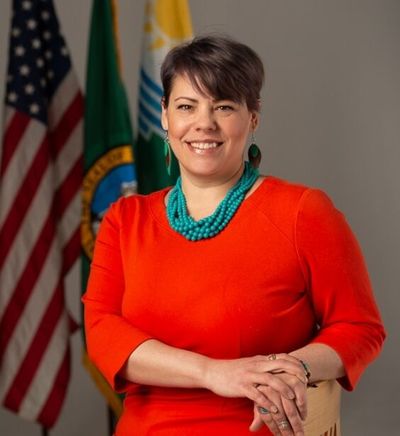Lindsey Shaw, former Logan neighborhood chair, announces run against Councilman Michael Cathcart

Lindsey Shaw, who until recently served as the chair of the Logan Neighborhood Council, is vying to represent northeast Spokane on the City Council.
She is the only declared candidate running in District 1 against conservative Councilman Michael Cathcart, who is the only incumbent running for re-election on the Spokane City Council this year. The district, which has two seats, is also represented by Councilman Jonathan Bingle, whose term is not up until 2025.
Shaw said in an interview that she was running for public office because of her passion for the city, and because she felt no council member should run unopposed. She believes that the city’s northeast district has not been prioritized by investment, and wants to change that trajectory.
“My district gets stigmatized, but it’s part of the richness of our city, and if Spokane is going to be healthy, we need to have all parts of it be healthy,” she said.
Bingle and Cathcart are the only members of the City Council’s conservative minority. Though both have claimed political victories during their terms, including augmenting the proposals of the council’s left-leaning members and occasionally spearheading bipartisan policy goals, they are often outvoted by the Council’s veto-proof supermajority.
The city’s northeast district is almost entirely bounded by Interstate 90 to the south and Division Street to the west, though after redistricting in 2022it also includes the entirety of downtown Spokane’s Riverside Neighborhood. The area has the highest levels of poverty in the city, but also a lot of up-and-coming businesses, parks, and will have access to newly drivable portions of the North Spokane Corridor later this year, Bingle noted in an interview.
“We’re going to have access to portions of the freeway before anyone else, which hopefully unlocks a lot of that area for investment, and realistically livable wage jobs with warehouses and shipping in that area once that corridor is finished,” he said.
If elected, Shaw said her top priorities would be safe parks, safe routes to schools and safe sidewalks.
“It seems like a nerdy thing to care about, but when I see people in wheelchairs riding in the street because there are weeds and simple things that could be fixed, I’m thinking about how we get programs and get to the table thinking about sidewalks,” she said.
But she was wary of some of the approaches to safety from those currently on the City Council. As a parent, she said she understood the concerns some have about safety in area parks. But while she hesitated to rebuke recent City Council decisions outright, she questioned the wisdom of increased penalties for drug users, a policy that just passed, and those in the park after hours, a policy currently under consideration.
“I don’t think the answer to any problem is to give people a record,” Shaw said.
“I have a family member who has struggled most of his life, and I’ve seen how jail doesn’t really heal anything,” she added. “I understand while walking down the street with my kids, (open drug use) is not what I want them to experience, but I would love a destigmatized solution.”
She noted that she had watched police crackdown on activity in Mission Park, only to see the people move to other nearby locations. Instead, she suggested that the city should be encouraging more lawful activities in local parks, crowding out undesirable behavior.
“I think it’s important to work with nonprofits, like If You Could Save Just One, or Zone, which have programs in our parks,” she said. “How could we partner with them to maybe adopt parks, and get neighbors involved?”
She also questioned a citizen’s initiative to outlaw homeless camps within 1,000 feet of schools, parks, playgrounds and childcare facilities, noting that her children attend a school a couple blocks from the Camp Hope homeless encampment.
“It’s been here the whole time, and I haven’t seen or heard the school say there have been any concerns,” Shaw said. “I think we have to have a certain amount of tolerance.”
Instead, Shaw said the response to homelessness should be an emphasis on building more affordable and middle-income housing. She suggested that recently approved charges on new development should be kept low in some areas to encourage infill, the building of new homes easily connected to city services.
“I think if we do more infill, rather than taking over more moose territory, we would be doing ourselves and our region a favor,” she said.
Born in Spokane, Shaw left the city as a young woman only to return in 2008 to help her mother run a cafe. She started holding cleanup events around the city, particularly along the Centennial Trail.
Shaw has lived in the Logan neighborhood for the better part of a decade, and has been an active member of the neighborhood council since purchasing her home around eight years ago. She served as that organization’s chair from 2019 until recently.
“As a parent, you realize how important it is to steward the best community that you can,” Shaw said.
During her time with the Logan Neighborhood Council, Shaw said she came to realize that the area’s needs did not seem to be prioritized by city leadership. She pointed particularly to the neighborhood’s requested traffic-calming projects, which she said were repeatedly denied.
“I suggested looking back at what we had asked for in the past and what was rejected,” she said. “It seemed disproportionate.”
In response, Shaw said she would repeatedly bring up the area’s infrastructure needs during city-level discussions about streets, persistent advocacy which she believes helped lead to improvements on Illinois Avenue.
“I’m just passionate about our city,” she said. “I’m not a politician, I’m not a lobbyist; this is grassroots for me.”